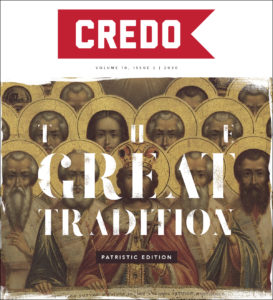The fires of war burned across the Roman Empire in the early 400s: in Gaul, then Iberia, Rome itself, and then in northwest Africa. Vandal hordes advanced, establishing a new Arian kingdom by violence, bringing dissolution to a decaying Roman order. Even places that had peace had an impending sense of upheaval.
In Hippo Regius, a small African port city a three-day journey from Carthage, citizens lived in a fairly comfortable world of normal daily rhythms despite the wars and rumors of wars. Seasons of planting and harvest; merchant success stories and failures; harbor traffic; work-days and evenings; births and deaths; family celebrations and family trouble, marked the rhythms of life. Everyone in Hippo was religious in one way or another. Varieties of Greco-Roman paganism, schools of philosophy, mystery cults and occult, Manicheanism, occasional Arians, Pelagians and then the Christians—Catholic and Donatist—formed a diverse community.
This was the place in which Augustine served in pastoral ministry, first as presbyter (391–395), then as bishop (395–430). Converted from a life of cosmopolitan self-pursuit, Augustine was marked by a deep awareness of God’s sovereign grace to him in Christ. His unexpected calling in the community of Hippo bore tremendous fruit, multiplied through his writing. Among these, his Confessions and The City of God provide enduring lessons for pastoral care and Christian discipleship.
Honest Self-Insight
The Confessions still stands as perhaps the greatest spiritual autobiography. Marked by deep and honest self-insight, worship, and wonder, Augustine wrote his Confessions a little over a decade after he came to Christ—just as he was entering ministry. The primary impetus seems to have come from his friend and fellow Christian Alypius, who encouraged him to write the story of his conversion for the sake of others. Some scholars believe a secondary factor may have been to relate his testimony to the wider church around the time of his ordination as bishop. The Confessions reveal the heart and mind of a pastor. Augustine masterfully exposits the soul’s unsettledness apart from God: “You have made us for yourself, O Lord, and our heart is restless until it finds its rest in you.”[1] Intentionally relating his own life story without a gloss, Augustine displays his sin and spiritual emptiness, and God’s patience, grace, and power in salvation. The entire work is a prayer of praise to God.
Hard Providences
The City of God is fascinating as it traces the contrasts and intermingling between the world (the city of man) and the Church (the city of God). What few realize is that Augustine wrote this near thousand-page book with tremendous pastoral and evangelistic heart, spiritual insight, and wry humor.[2] His detailed exposures of Greco-Roman paganism are aimed at not only guarding the Church, but also bringing pagan readers to see the devastating folly of their claims, in contrast with the truth and beauty of the gospel. Augustine draws on the history of redemption, as well as his contemporary church in narrating the story of God’s city.
The first book of The City of God brings us immediately into his ministry. Here is a world of brokenness and suffering on a scale exceeding what most of us have experienced: “Christians were slaughtered and were put to death in a hideous variety of cruel ways.”[3] Augustine shepherds readers through the horrors of war, the prosperity of the wicked, and the sufferings of the saints. His counsel is tender and direct. He grieves with victims, and shares outrage at evildoers and evils perpetrated.
Counseling those tempted by thoughts of suicide while facing, or after having suffered, Vandal brutality and sexual violence, Augustine reminds us that “we should not endeavor by sin to obviate sin:”[4] “No man ought to do so on account of another man’s sins, for this would be to escape a guilt which could not pollute him, by incurring a great guilt of his own; this no man ought to do on account of his own past sins, for he has all the more need of this life that these sins may be healed by repentance.”[5] Someone questions, “Why did God allow such evils to be perpetrated against me?” Augustine answers, “…indeed it is a deep providence of the Creator and Governor of the world; ‘unsearchable are his judgements, and his ways past finding out.’”[6] Augustine evidenced a deep commitment to catholic orthodoxy in his calling as a shepherd of souls. Click To Tweet
Augustine reminds those struggling with a sense of guilt after abuse that “when a woman is violated while her soul admits no consent to the iniquity… the sin is not hers, but his who violates her.”[7] She “remains inviolably chaste” and is to be honored for her chastity through trial.[8] In grappling with whether feeling pleasure in the midst of sexual violation reflects sin, Augustine encourages readers to personally consider whether there was some degree of lust in their heart, or whether it was a blameless physical response—emphasizing the normalcy of the latter. Yet, even where evil is faithfully suffered, there is no ground for pride, but rather adoration to God: “Faithfully interrogate your own souls… If you did not consent to sin, it was because God added his grace…”
Acknowledging the mysteries of God’s holy wisdom, Augustine encourages the suffering to see hard providences as a place in which growth in faith, repentance and new obedience can occur. Whether we become aware there may have been sin mixed in our response to abuse, or convinced there was not, Augustine reminds us that when we place our suffering in the Lord’s sovereign, gracious purpose we will see “when he exposes us to adversities, it is either to prove our perfections or correct our imperfections.”[9] His trust in our ever-faithful God shines through his ministry: “[God] could never have permitted these disasters to befall his saints, if by them that saintliness could be destroyed which He Himself had bestowed upon them, and delights to see in them.”[10] While the gospel is not always explicit in the opening sections of The City of God the reader who continues will see a rich proclamation of Christ whose “blood was shed for the remission of our sins.”[11]
A Deep Commitment to Orthodoxy as a Shepherd of Souls
Augustine evidenced a deep commitment to catholic orthodoxy in his calling as a shepherd of souls. In a sermon on John 17, he reminds the congregation that, “the Father sanctifies in the truth, that is, in his own Word, in his only begotten, his own heirs and his (the Son’s) co-heirs.”[12] A few sentences later he reaffirms this stating, “everyone assuredly who believes in Christ believes the gospel… we too, born long afterwards, have believed in Christ through [the Word].”[13] Time and again Augustine’s sermons reveal a steady commitment to the whole counsel of the Word of God. His theological writings are also a display of this dedication. As you read Augustine’s writings you will come to realize they display a remarkable breadth and depth of knowledge of the Word. Click To Tweet
Written and refined over some seventeen years of his ministry in Hippo, Augustine’s On the Trinity is a positive exposition of a scriptural doctrine of the Trinity, as well as a rebuttal of those, like Arians and subordinationists, who denied aspects of Trinitarian or Christological orthodoxy. Augustine’s aim was to show that “the unity and equality of the supreme Trinity is established from the sacred scriptures, and [that] some texts alleged against the equality of the Son are explained.”[14] Seeing that “when the fullness of time was come, God sent forth his Son, made of a woman, made under the law” Augustine explains that
if the Son is said to be sent by the Father on this account, that the one is the Father, and the other the Son, this does not in any manner hinder us from believing the Son to be equal, and consubstantial, and co-eternal with the Father, and yet to have been sent as Son by the Father. Not because the one is greater, the other less; but because the one is Father, the other Son… He was not sent in respect to any inequality of power, or substance, or anything that in him was not equal to the Father; but in respect to this, that the Son is from the Father, not the Father from the Son…[15]
Augustine placed the reason for the person sent in the relationship of the persons of the Trinity, seeking to describe the incarnation in a way that clearly maintained the ontological unity of being of the Godhead. In doing so he maintained the Nicene exposition of the faith delivered once for all to the saints (Jude 3), and at the same time refuted errors which implicitly or explicitly posited a subordination of the Son to the Father in essence.
Endless Reasons to Read Augustine
There are many other reasons to read Augustine. His writings against the Pelagians teach us much about God’s sovereign grace; his letters encourage us in friendship, mentoring, and hard ministry situations. His sermons, though tending to allegorical interpretation, are richly practical, direct, and often Christ-centered and doxological. As you read Augustine’s writings you will come to realize they display a remarkable breadth and depth of knowledge of the Word.
Sitting in a garden in Milan, just moments before his conversion, he heard a child saying, “tolle lege”—“take up and read.” He did for a lifetime. We do well to have his company in doing the same.
Endnotes
[1] Augustine, Confessions, trans. Henry Chadwick (Oxford: Oxford University Press, 1998), 3.
[2] “I think I have now, by God’s help discharged my obligation in writing this large work. Let those who think I have said too little, or those who think I have said too much, forgive me; and let those who think I have said just enough join me in giving thanks to God. Amen.” Augustine, The City of God, trans. Marcus Dods (New York: The Modern Library, 2000), 876.
[3] Augustine, The City of God, 16.
[4] Augustine, The City of God, 30.
[5] Augustine, The City of God, 31.
[6] Augustine, The City of God, 33.
[7] Augustine, The City of God, 23.
[8] Augustine, The City of God, 23.
[9] Augustine, The City of God, 35.
[10] Augustine, The City of God, 34.
[11] Cf. Augustine, The City of God, 587-605; 716-717.
[12] Augustine, Homilies on the Gospel of John in Nicene and Post-Nicene Fathers, vol. 7, ed. Philip Schaff (Grand Rapids, Eerdmans, 1988), 405.
[13] Augustine, Homilies on the Gospel of John, 406.
[14] Augustine, On the Trinity in Nicene and Post-Nicene Fathers, vol. 3, ed. Philip Schaff (Grand Rapids, Eerdmans, 1988), 17.
[15] Augustine, On the Trinity, 82-83.


